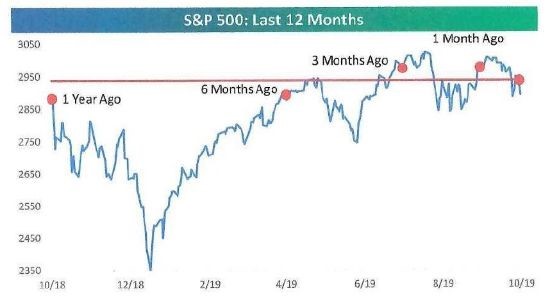- Third quarter earnings: Usually when the analyst expectations bar is set low for earnings season, the S&P 500 sees a positive performance during earnings season. Conversely, when the bar is set high into earnings season, the market has struggled during the reporting period. This season the bar has been set very low as Q3 corporate earnings growth estimates decline to minus 4.5% (source: FactSet). We could be set up here for a positive surprise with the caveat being comments about the trade war impact during company conference calls.
- Sentiment: The American Association of Individual Investors (AAII) reading on bullish sentiment dropped to 20% last week. This reading takes out the lows from the Q4 2018 sell-off and is at the lowest level since May 26, 2016 (and 1993 prior to that). Most interesting is that the S&P 500 is only 2% away from its all-time high despite the pessimism. Last week’s reading follows two sub-30% bullish readings in the previous two weeks. If you look at the seven previous times bullishness was this low in the AAII survey, five of those times marked permanent lows in stocks. After each of those five readings, markets never closed a week at lower prices.
- Range bound: Despite big short-term moves, the S&P 500 is currently at the same level it was at last month, three months ago, six months ago, and one year ago – see the chart below. Bulls are quick to point out that long periods of consolidation are usually resolved to the upside. We will point out that the P/E multiple on the S&P 500 is about 2x lower now than when the market first peaked in January 2018. A return to the old P/E high would result in price appreciation of about 10% from these levels.

Source: Bespoke Investment Group
- 2020 election: With more than a year until the election in 2020, a lot can and will change. But currently, according to the betting website Predictit, Elizabeth Warren has increasingly become the favorite in the Democratic field and trails President Trump by only a small spread.
President Trump 39 ¢
Elizabeth Warren 34 ¢
Joe Biden 14 ¢
Truce With China: Has the Mini-Deal De-Risked the Markets?

Markets are enamored with every single headline, story or tweet related to trade discussions. But it creates a lot of noise that is almost impossible to see through for real issues driving equity prices.
Chinese sources refused to call last week’s agreement a “deal” and appeared to play down expectations. Some details of the deal have not been confirmed officially by China, either. Bloomberg reported that China wants further talks to confirm certain aspects the White House claims the Chinese agreed to. Even if the deal is in place, it does not represent major progress. Major issues were not dealt with but rather deferred until phase two or three.
How will this affect U.S. stocks? The markets aren’t in a much different place than they were before last Friday’s announcement. Yes, the U.S. and China called a truce, but nothing sensitive was agreed to. Investors will have to deal with trade uncertainty for a while longer. Concerns about global growth will continue-and the recession hawks in the U.S. will resurface. Bond prices are likely to rally (yields fall) and market leadership (‘defensives’ such as utility, real estate, and consumer staple stocks) will probably stay the same. Cyclical stocks will continue to lag in our opinion due to uncertain growth prospects.
The lack of any break-through trade news passes the baton back to earnings. Investor attention is now focused on Q3 earnings reports which start this week – early reports are encouraging. Better than expected earnings are the markets’ best recipe for higher prices – real trade progress will have to wait.
